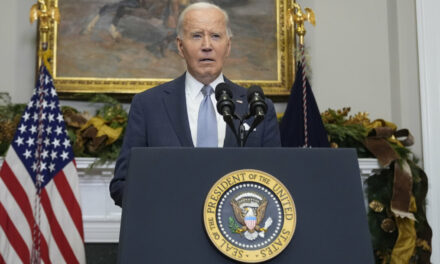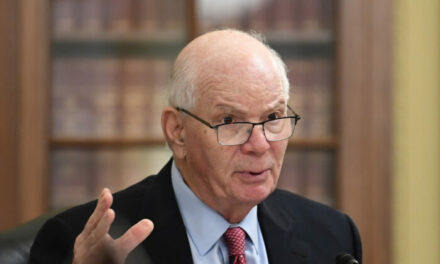We support our Publishers and Content Creators. You can view this story on their website by CLICKING HERE.
‘The [continuing resolution] is coming together. Bipartisan work is ongoing,’ the House speaker told reporters during a Dec. 17 press conference.
WASHINGTON—House Speaker Mike Johnson (R-La.) said that lawmakers are nearly done finalizing a plan to keep the government funded through March 2025.
“The CR is coming together. Bipartisan work is ongoing. We’re almost there,” Johnson told reporters during a Dec. 17 press conference, referencing a “continuing resolution” (CR), which is Washington-talk for a stopgap funding bill.
Johnson said he expects the text of that bill to be released sometime soon.
The core function of the bill will be to punt the deadline for government funding three months out, to March 14, averting a Christmas shutdown that would otherwise begin on Dec. 20.
Currently, it could be difficult for lawmakers to pass the legislation in time due to a House rule requiring that legislation be considered 72 hours or more after its release.
Johnson indicated that he intended to align with this rule, which would punt the vote on the CR to Friday.
Additionally, Senate Minority Whip John Thune (R-S.D.)—the incoming majority leader—said he believes the Senate may need to work into the weekend to pass the legislation.
“If we don’t get [bill text] today, and they don’t act on it until tomorrow, it pushes us into the later parts of this week, or maybe into the weekend,” Thune told reporters on Tuesday. “But who knows? Maybe the Christmas spirit will kick in.”
Johnson said his intention was for the CR to be “a very simple, very clean … stopgap funding measure to get us into next year when we have unified government under the Republican Party. But a couple of intervening things have occurred.”
That includes hurricanes Helene and Milton, which devastated large swaths of Florida and western North Carolina in October.
Johnson confirmed that emergency hurricane assistance was expected to be part of the bill.
“We had, as we describe it, an act of God. We had these massive hurricanes, as you know, in the late fall: Helene and Milton and other disasters,” Johnson said. “We have to make sure that the Americans that were devastated by these hurricanes get the relief they need.”
Johnson didn’t mention how much funding would be included for this emergency relief. President Joe Biden has requested a $100 billion support package.
Not every Republican is on board with this aid.
“It’s unpaid for, I oppose it,” Rep. Chip Roy (R-Texas), an outspoken deficit hawk, told The Epoch Times earlier in December.
“The purpose of the federal government isn’t to be an ATM. We’ve got to get real. It’s $100 billion of just free money.”
The CR is expected to wrap in agriculture-related provisions, including $10 billion to assist a farm sector that Johnson described as “struggling” due to droughts, inflation, and other economic factors.
“The people who supply the food for the country are in dire straits right now,” Johnson said. “And so Congress recognizes that need, and so we’ve had to add a little bit to that as well.”
Despite lawmakers’ push to get the funding issue dealt with ahead of the impending winter recess, several Republicans are unhappy with what they’re seeing from leadership.
These critics say the added content in the CR makes it look more like the long-despised end-of-year “omnibus” spending bill, which historically has wrapped all government funding into one large, single package.
“The CR is looking more and more like an omnibus in the sense that we don’t know what’s in it,” Sen. John Kennedy (R-La.) told reporters on Dec. 16. “They need to saddle up and ride and get this thing put together and keep it to the bare minimum, in my opinion.”
Kennedy indicated he would be a “no” vote on the legislation.
Rep. Tim Burchett (R-Tenn.) was also critical.
However, Johnson resisted comparisons to the Christmas omnibus when probed by reporters.
“This is not an omnibus, OK. This is a small CR that we’ve had to add things to that were out of our control,” Johnson said.
Still, the addition of so many riders to the CR—a type of measure already unpopular with many Republicans—means that passing the bill will almost certainly rely on Democratic support.
Historically, Democrats have backed CR legislation almost unanimously, while Republicans often split 50/50 in their support.
However, it’s unclear whether Democrats will continue that trend for the upcoming CR.

 Conservative
Conservative  Search
Search Trending
Trending Current News
Current News 







